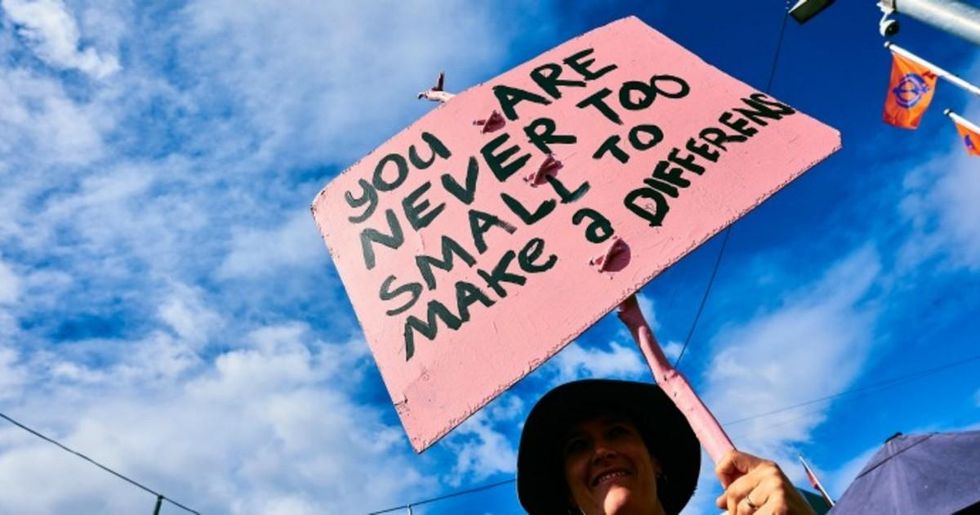
In preparation for a nonviolent mass direct action planned for April that Extinction Rebellion says will be “impossible” for policymakers to ignore, the global climate movement’s United Kingdom arm on Sunday announced a resolution for the new year: temporarily ending its headline-grabbing, disruptive tactics including gluing protesters to government buildings and rush-hour trains and blocking traffic to draw attention to the climate crisis.
The U.K. group will no longer use “public disruption as a primary tactic,” saying in a statement that “what’s needed now most is to disrupt the abuse of power and imbalance, to bring about a transition to a fair society that works together to end the fossil fuel era.”
“In a time when speaking out and taking action are criminalized, building collective power, strengthening in number, and thriving through bridge-building is a radical act.”
“This year, we prioritize attendance over arrest and relationships over roadblocks, as we stand together and become impossible to ignore,” Extinction Rebellion U.K. (XRUK) said.
The group announced the shift away from public disruption as it prepared for a mass protest called “The Big One,” in which it’s planning to mobilize 100,000 people to surround the Houses of Parliament in London on April 21 and demand climate action and an end to the government’s support of the fossil fuel industry.
Instead of orchestrating actions in which demonstrators disrupt daily life, the group said, XRUK is urging supporters to spend the 100 days leading up to The Big One “holding millions of conversations with friends, family, colleagues, and strangers” to spread the word about the action as organizers work to partner with other environmental campaigns.
“A powerful targeted marketing campaign across all channels will reach new audiences with an accessible, inclusive, and easy-to-understand invitation while simultaneously bringing in funds,” said XRUK.
The group’s shift away from disruptive tactics follows the introduction of new protest restrictions in the U.K. The Police, Crime, Sentencing and Courts Act made it an offense to “intentionally or recklessly [cause] public nuisance” and allowed police chiefs to impose start and finish times for demonstrations and set noise limits. A new bill proposed in October by the Conservative government would make “interference with key national infrastructure” punishable by imprisonment.
“In a time when speaking out and taking action are criminalized, building collective power, strengthening in number, and thriving through bridge-building is a radical act,” said the organization.
While XRUK is targeting dialogue between communities and direct nonviolent pressure on policymakers—choosing 100,000 people for the April 21 protest because that is the number of signatories needed for a petition to force Parliament to address a demand—groups such as Just Stop Oil have recently drawn attention to their disruptive tactics, vandalizing works of art such as Vincent Van Gogh’s “Flowers” at London’s National Gallery.
XRUK argued in its statement Sunday that widespread anger in the U.K. over the cost of living makes it all the more likely that members of the public will be open to assembling at Parliament to voice their discontent with a government that is continuing to issue oil and gas licenses in the North Sea and subsidize fossil fuel companies, despite dire warnings about continued oil and gas extraction.
“This is a moment of huge potential,” said XRUK. “Word on the streets is that the cost-of-living crisis is the price of climate inaction. The government’s unlawful plans have never been so transparently flawed and widely understood… Worsening climate conditions are already impacting global food supplies and that will only further exacerbate the cost-of-living crisis, meaning that change is not only necessary, it is inevitable.”
By leaving “the locks, glue, and paint behind” and assembling in large numbers at Parliament Square for as long as they are able, supporters of the protest “will create a positive, irreversible, societal tipping point,” XRUK added.
“Recent history is full of examples of the power of people power—of your power. Here are just a few:Epifanio de los Santos Avenue, Manila, February 1986;Wenceslas Square, Prague, November 1989;Maidan Square, Kyiv, November 2004,” said the group. “All that’s missing from the list is Parliament Square, London, April 2023.”




